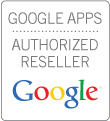Google endorses the cloud channel

With the launch of its Authorized Reseller program today, Google publicly acknowledges something that's been privately evident for some time: most all its significant enterprise wins for Google Apps wouldn't have happened without partners to champion and manage the implementation (another SaaS partner myth debunked).

"We have brought to Google many clients because of this work we have been doing the past two years," Revevol's CEO Laurent Gasser told me yesterday, emphasizing Google's debt to his company: "Once you have that type of traction in the market, it's easier to get going."
Google's dependence on partners is similar in the US — albeit with a larger band of them, including Appirio [disclosure: a recent client], SADA Systems, Horizon Info Services and the evocatively named Cloud Sherpas. Look under the covers of any significant enterprise win and you'll see the hidden hand of a partner making it possible (although many large corporations prefer not to disclose their reliance on the services of a third-party integrator).
Those partners now welcome Google's public endorsement of their role, which allows them to set up Google Apps accounts on behalf of their customers (albeit manually, not via an automated API) and bill for the Google subscription fee under their own name. The 20 percent margin they'll now be able to earn (from March officially) on that subscription isn't really material; what matters is the ability to close the deal and get started without having to send the customer off to sign up separately with Google and then come back to share the administration rights so they can start on the implementation process.
"We were really missing the fact that we could not sell the product," said Gasser. "It was really difficult for us not being able to sell it." Since joining the pilot program, Revevol's sales have accelerated, he told me, with close to 30 customers starting implementations in the last three months of 2008, including one project of more than 3,000 users.
Although Revevol is happy to take on customers of any size from 50,000 seats or more down to just 20 users, it's that middle range of company size where it sees most opportunity. "The real growth potential is in the mid-market," said Gasser, defining that as companies with from 200 to 5,000 users. "These are quick wins," with a sales cycle of 3-5 months, he said. "With the [credit] crisis it is a big opportunity for us — you get incredible savings because of the [lower] costs."
Anyone can now apply to become a Google Apps reseller, but authorization will only be granted after a company has successfully implemented at least 25 users (not necessarily all at the same client). Google looked at other ways of assessing readiness, but concluded that, "There's no substitute for a live example," explained Peter Lorant, head of channel for Google Enterprise EMEA. Google will hold onto the 20 percent margin on those first 25 seats, but there's no other cost to join the program, which offers access to downloadable sales and marketing material (in 25 different languages!), online videos and training.
Of course, the reseller will have to bring a substantial investment in expertise to the table. The main revenue opportunity lies beyond the subscription, in offering professional services for integration, data migration, training, ongoing custom development and change management, as well as in the scope for upsell to additional cloud services and associated integration/aggregation work. Gasser said he regards the 20 percent — worth just $10 or €6.50 per user per year — as an annuity that pays back in the future. "Of course the margins are small compared to standard resellers. But this is recurrent," he explained. "This is for me like an insurance. Once it's sold to the client it's renewed every year."
Google sees the reseller accreditation being attractive to four main groups, said Lorant:
- Web 2.0/cloud integrators like Appirio and Revevol
- Large SIs like Cap Gemini, Accenture and others
- Traditional VARs who currently sell Microsoft and Notes solutions. "This gives them a tremendous opportunity to differentiate," he said.
- ISPs and telcos
But whatever their background, what's most important is their attitude, he added: "We need these people that understand they're signing up with a different experience with Google than the legacy software they're used to dealing with," he said, pointing to the 100 new features that were added to Google Apps last year. "We want to get the right kind of people that understand about being on this innovation cycle. We need [this] ecosystem to help fulfil the demand and to drive it as well."